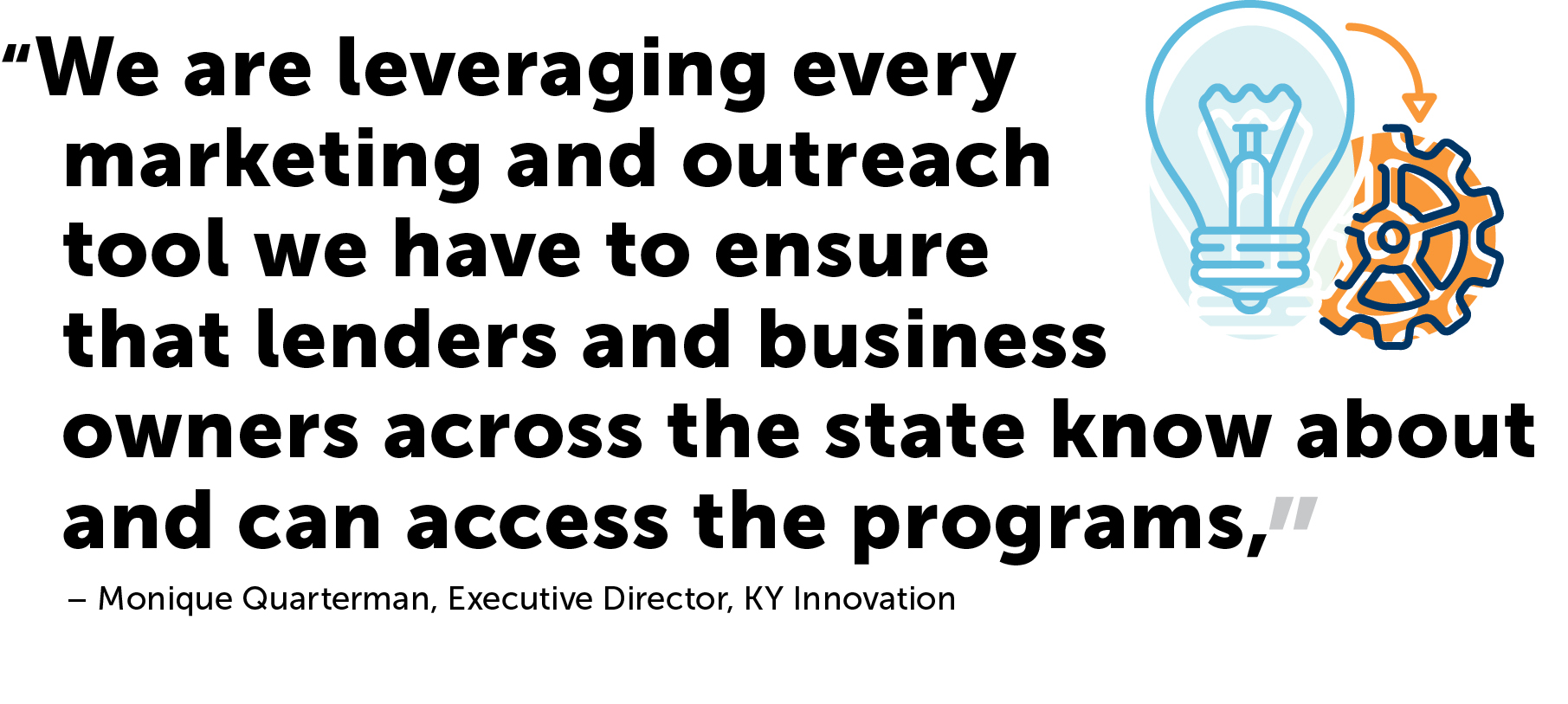Starting a business from the ground up is no small fear. Each new venture an entrepreneur begins to bring their idea to life comes with its own set of challenges, as no two experiences are one and the same. While their paths to success differ, Kentucky’s already powerful suite of business support programming now offers additional fuel for the journey in the form of the Kentucky Small Business Credit Initiative (KSBCI) 2.0.Small businesses account for 99.3% of all of Kentucky’s companies, supporting 43.3% of Kentucky employees, according to the U.S. Small Business Administration’s 2022 Small Business Profile. With the state’s strong support network, backed by the influx of new funding, there has never been a better time than now to take an entrepreneurial leap of faith in Kentucky.
Increased Access to Capital
In 2023, the state received a $117 million award from the U.S. Department of Treasury’s State Small Business Credit Initiative (SSBCI). The award, which is to be allocated in three phases over a 10-year period, has put Kentucky in a position to change the landscape of its entrepreneurial ecosystem. KY Innovation, a branch of the state’s Cabinet for Economic Development which focuses on connecting entrepreneurs to resources, as well as providing several resources and business incentives, will use the funding to launch Kentucky’s SSBCI 2.0. The revitalized initiative will include loan support programs and venture capital programs, both of which will include added incentives for capitalizing businesses owned by socially and economically disadvantaged individuals (SEDI).

“SSBCI funding is an unprecedented influx of capital for Kentucky businesses that comes at an important inflection point for our economy,” said KY Innovation Executive Director Monique Quarterman. “We have long known that small and growing enterprises in the state are hungry for both debt and equity investment instruments that will help them start and scale. We have already seen so many companies, from traditional small businesses to scalable startups, receive funding they might not have been able to obtain. It has been extremely positive in the short term, but the long-term impact has the potential to be transformational.”
The previous version of SSBCI, established through The Jobs Act of 2010, allocated $15.5 million to Kentucky, which primarily deployed the funds through its collateral support program. Since its inception, the KSBCI program provided over $22.5 million in KSBCI support. This accounts for over $182.4 million in small business investments. That successful experience brought lessons to the Cabinet and KY Innovation’s team about what needs were prevalent among the state’s emerging network of startups. Kentucky will devote 30% of KSBCI 2.0 funding to build upon its loan support capabilities, with a focus on SEDI business owners.
Through KYCSP, the Cabinet offers a pledged asset up to 20% of an individual’s loan to strengthen collateral coverage of the borrower to meet the lender’s security requirements. It is important to note that the Cabinet and KY Innovation work to connect businesses to its network of participating lenders to secure a loan that works best.
The KYLPP allows the Kentucky Economic Development Financial Authority to purchase up to 20% of a small business loan to support the lender or community development finance institution (CDFI), which in turn allows for larger loans to be distributed. Kentucky will also significantly expand the amount and availability of venture capital funding in the state. Seventy percent of Kentucky’s SSBCI 2.0 funding, or $82 million, will go toward venture programs.
The first of these to launch, Kentucky Matching Ventures Fund, is a direct equity investment vehicle already providing capital to startups in the state. This represents a major step up for critical early-stage funding in the state.
“We are leveraging every marketing and outreach tool we have to ensure that lenders and business owners across the state know about and can access the programs,” said Quarterman. “We are fortunate that the program itself incentivizes access to the extraordinary extent that it does. Even though we are happy with our progress, we are going to be working even harder in the years to come to meet the entire spectrum of Kentucky’s business community where they are.”
Growth Around the Globe

A Kentucky STEP grant helped FeltLOOM in Sharpsburg do business in international markets.
Photo courtesy of Kentucky.com
While homegrown ideas start small, they by no means stay that way. As companies grow, so does their reach, often catching the attention of customers far beyond the state’s borders. The ability to export goods and services worldwide is an essential aspect to growth and long-term stability.
In doing so, entrepreneurs are faced with challenges such as how to get started in these markets and the costs associated with international travel.
For over 11 years, Kentucky has supported its businesses in obtaining that global reach through the State Trade Expansion Program (STEP). Funded through the U.S. Small Business Administration, Kentucky has received and deployed $4.4 million to support exporting over that time.
STEP allows small to mid-size businesses to increase export sales by reimbursing participating companies for costs associated with entering and expanding into international markets. Businesses can currently receive reimbursement for up to $10,000 in qualifying expenses. “Companies participating in the Kentucky STEP grant program are given the flexibility of using their awards as they see best to get reimbursed for activities such as learning to export, compliance testing, internationalizing company website fees, translations of websites, packaging labels and manuals, services offered by the U.S. Commercial Kentucky Service Trade Offices, exhibiting at trade shows with international audiences, foreign market sales visits, credit insurance premiums and more,” said STEP Program Director Mary NeCamp.
Companies that are new to the program are required to spend initial funds on measures like export training, website development for an international audience and marketing.
To date, STEP has worked with over 235 Kentucky businesses. NeCamp states that the program has received applications from 53 of Kentucky’s 120 counties and aims to reach all 120 counties over the next few years to make more dreams into realities.
STEP companies also gain access to exporting experts within the Kentucky Export Initiative. The network of partnering organizations carries the expertise of how to navigate international markets, helping small businesses connect to the right markets, evaluate potential foreign business partners and increase market potential, also offering gold key matchmaking services and website globalization support. In having all costs associated with those measures fully reimbursed by STEP, this can allow for valuable breathing room for growing small businesses.
“The STEP grant helped FeltLOOM Inc. do business in the international markets. It helped pay for our compliance testing to ship into foreign markets and raised awareness for our business opportunities that are available in the world. It has been important to our small company, and we currently sell into 21 countries,” said FeltLOOM President Lanette Freitag.

